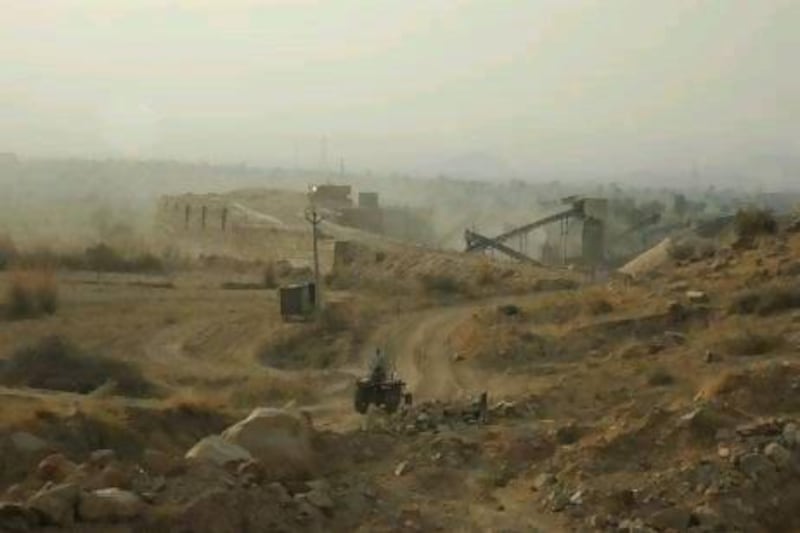NEEM KA THANA, INDIA // One of India's most stunning mountain ranges is under threat from an illegal stone-mining "mafia", residents say.
Gulla Ram, a 70-year-old farmer in the village of Biharipur on Dabla mountain, is driven to tears as he describes how stressful his life has become.
"We have 100 trucks coming through our village every day. It is like a living hell," he said.
Sure enough, a truck came hurtling through the narrow dirt-track in the centre of the village just seconds after he spoke - a thundering behemoth shattering the peaceful evening in the remote mountain village.
When it is not trucks, it is explosions. Often dozens at a time. They can come at any moment of the day or night.
"We are waiting for the explosion that kills us," said Lali, a 50-year-old resident, as she showed the cracks that have appeared in the walls of her home over the past two years.
The villages on the mountain have become the main focus of resistance to what locals refer to as the "mining mafia". They accuse local politicians and police of conspiring with quarry owners to ignore regulations.
The Aravalli mountain range, which includes Dabla, stretches deep into central India, but is rarely as arresting as in Rajasthan - breaking out in majestic, other-worldly formations from a rugged landscape of yellow scrubland and rocky desert. But these days, the mountains have become valuable for more than their natural beauty as India's booming construction industry is in a desperate search for marble and elements, such as clay and sand, to make cement.
Dabla is one of the last parts of the Aravalli Range still open to mining after the Supreme Court, concerned about reports of environmental devastation, banned miners from operating in the neighbouring state of Haryana in 2009.
Miners flocked instead to Rajasthan, where local officials have allowed the mushrooming of quarries and stone-crushing units through the hills and valleys.
"Mining is the need of the hour," said Praveen Khandelwal, assistant to the local legislative assembly member, his father, Rajesh Khandelwal. "If every rule was followed, not a single mine would be operating."
Quarry after quarry sits alongside water bodies or next to roads in direct breach of court orders.
Two stone-crushing sites on the main highway, just minutes apart, have dumped huge piles of rubble and dirt directly in front of schools.
"These mines and crushers are destroying rivers, destroying crops, destroying villages," said Kailash Meena, the local representative of the People's Union for Civil Liberties, who has been spearheading the anti-mining campaign.
"Every government officer knows these mines are illegal but no one is taking any action."
The miners, knowing the illegality of their work, often are seen running away at the sight of outsiders, abandoning their blasting equipment on the mountain side.
Villagers complain the quarries are encroaching on communal grazing land and protected forest reserves, and drying up water supplies they need for crops and animals.
Government documents obtained by activists last summer showed that 49 mining leases had already been granted for Dabla mountain alone, of which a third were already in operation, along with 22 sand-silting operations and five stone-crushing sites.
Last June, a local resident, Samil Ram, who led protests against the miners, was arrested on charges of inciting violence. He says police tortured him by shoving chillies into his anus. Repeated attempts to contact the local police superintendent were unsuccessful.
Six months later, Mr Meena was picked up on similar charges, causing an uproar among villagers and the civil-rights community.
Both men are out of jail on bail awaiting trial, and both said they received phone calls threatening violence against them for talking to a journalist this week.
The government justifies the presence of quarries and stone crushers by saying they have brought significant revenue and employment to an impoverished area.
The locals counter that very few of them have received jobs working for the mining companies.
"It is not the people who are against mining - it is one or two NGOs who are communist sympathisers," said Praveen Khandelwal, "They are parasites and good-for-nothings, and they are just trying to extort money from the miners."
Mr Khandelwal did admit that regulations were regularly flouted by mining operations and that many operated illegally. He blamed ambiguous rules and the lack of local supervising authorities for the lapses, and denied taking any bribes from mining companies.
erandolph@thenational.ae
Follow
The National
on
[ @TheNationalUAE ]
& Eric Randolph on
[ @EricWRandolph ]





